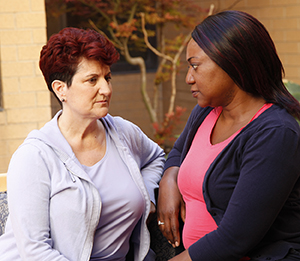Everyone feels down at times. The blues are a natural part of life. But an unhappy period that’s intense or lasts for more than a few weeks is different. It can be a sign of depression. Depression is a serious illness. It's not a sign of weakness. It's not a choice or a character flaw. And it's not something you can just snap out of. Most people with depression need treatment to get better. Depression can disrupt the lives of family and friends. If you know someone who may be depressed, find out what you can do to help.
Symptoms of depression
People who are depressed may:
-
Feel unhappy, sad, blue, down, or miserable almost all day, almost every day
-
Feel helpless, hopeless, or worthless
-
Lose interest in hobbies, friends, and activities that used to give pleasure
-
Not sleep well or sleep too much
-
Gain or lose weight
-
Feel low on energy or always tired
-
Have a hard time focusing or making decisions
-
Lose interest in sex
-
Have physical symptoms. These include stomachaches, headaches, or backaches.
Know the serious signs
Never ignore a person's comments about suicide. Or behaviors that can lead to self-harm. Warning signs for suicide include:
-
Threats or talk of suicide. Talk of harming themselves or others.
-
Saying things such as, “I won’t be a problem much longer” or “Nothing matters.”
-
Giving away their things. Or making a will or funeral plans.
-
Buying a gun or other weapon.
-
Stockpiling medicine
-
Sudden, unexplained cheerfulness or calm after a period of depression.
If you see any of these signs, get help right away. Call a doctor, mental health clinic, or suicide hotline. Ask what you should do. In an emergency, call or text
If you are concerned that your friend may be thinking about suicide, ask them. Asking about suicide does not lead to suicide. If your friend talks about suicide, act right away! Suicidal thoughts or actions are not a harmless bid for attention. They are a sign of extreme stress and should not be ignored.
If the threat is immediate (your friend has a plan and the means to carry it out), call or text 988 Don’t leave your friend alone. Remove any means, such as guns, rope, or stockpiled pills.
To learn more
-
Crisis Text Line, Text HELLO to 741741
-
National Institutes of Mental Health at www.nimh.nih.gov or 866-615-6464
-
National Alliance on Mental Illness at www.nami.org or 800-950-6264
-
Mental Health America at www.mhanational.org or 800-969-6642
-
988 Suicide & Crisis Lifeline at 988lifeline.org . Or call or text
988


